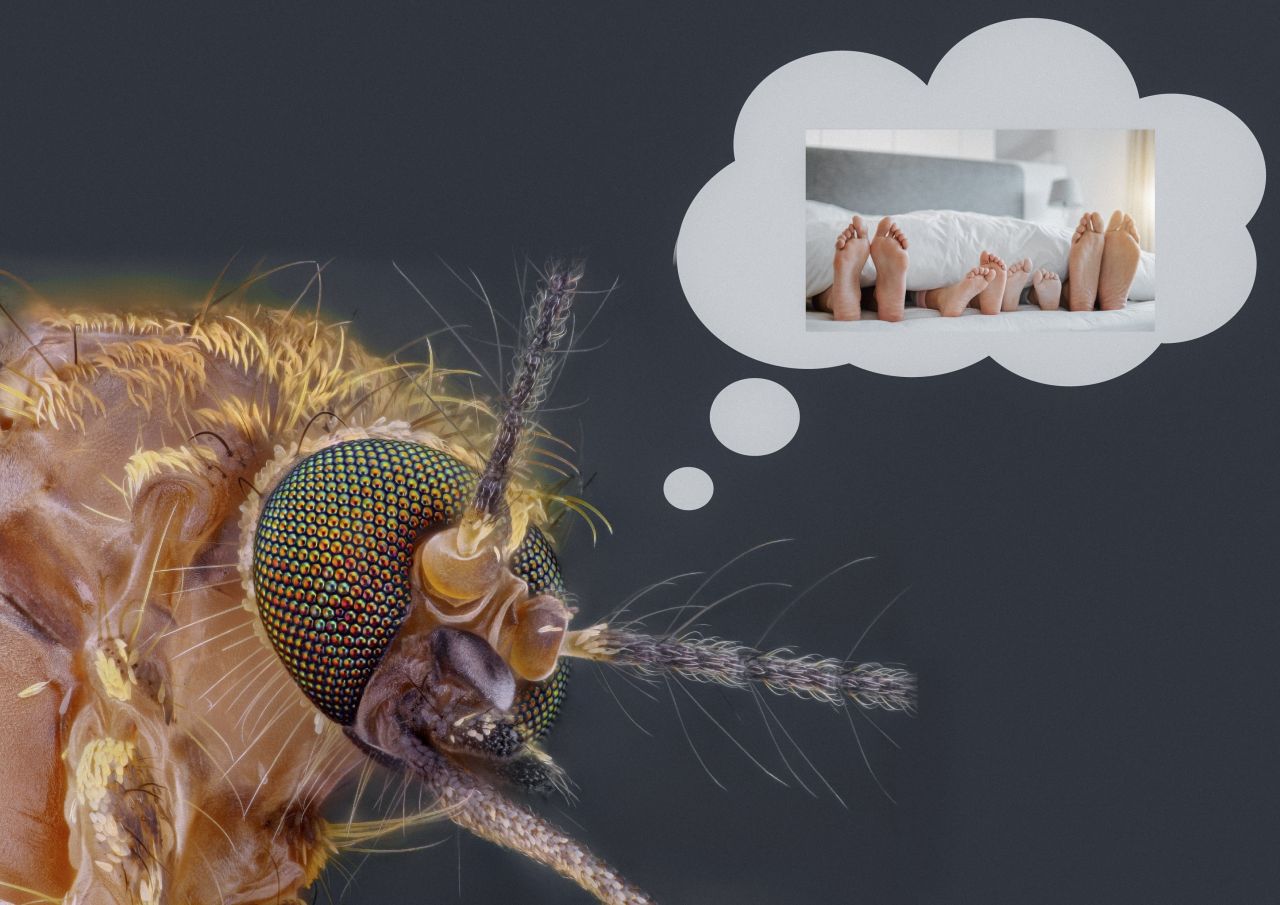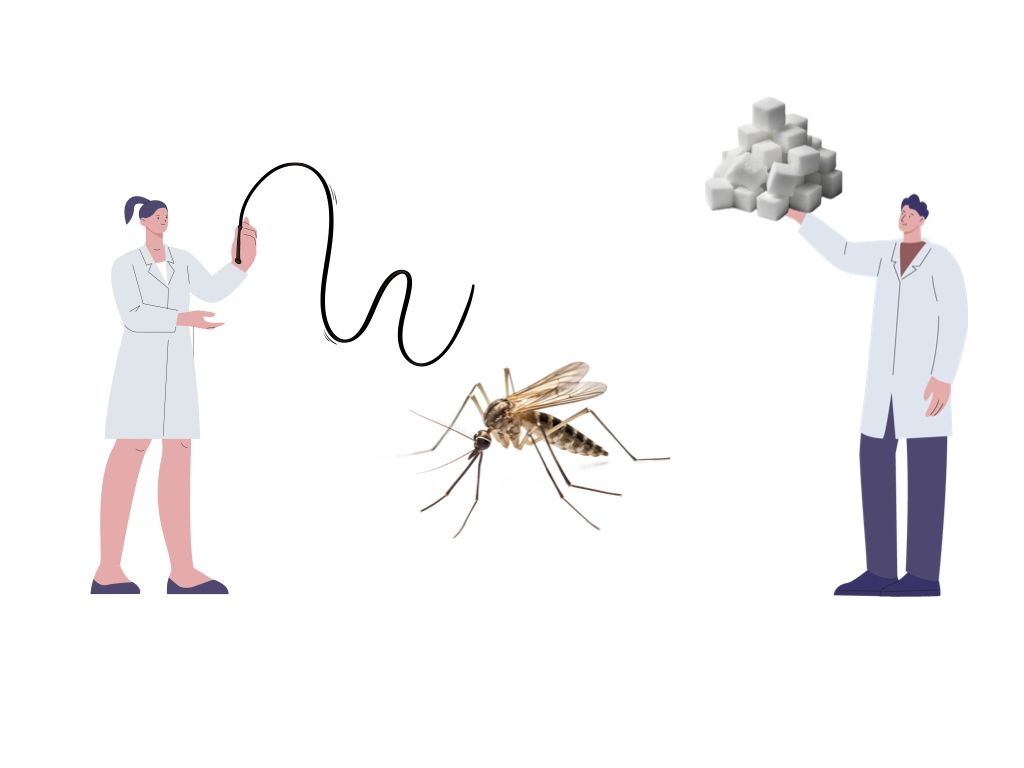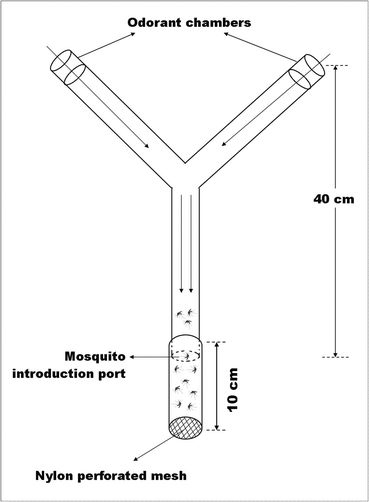Bittersweet memories
We remember mosquitoes by their annoying buzz, their endless thirst for blood and the itchy marks they leave on our skin. But have you ever wondered how a mosquito remembers us? Turns out that they are smarter than we think.

Mosquito remembering her previous victims. Image: Collage from Adobe Stock (1-2)
Learning and memory play a fundamental role in the life of an insect and provide flexibility for adaption when conditions are not optimal. Decades of research focusing on the memory and learning abilities of insects have focused mainly on fruit flies and honeybees. Since the 2000s, the growing body of studies on the memory of mosquitoes has provided valuable insights into our understanding of its role in host* selection and disease transmission.
First experience is important
A female mosquito requires a blood meal to produce eggs, therefore she needs to pick a victim wisely. After carefully assessing the odor composition of the individuals present, she makes her mind and ambushes her prey. However, things don’t always go smoothly as many hosts exhibit certain defense mechanisms such as twitching their skin, grooming and in some cases, swatting. If the mosquito survives the attack, then it is time for it to reflect and learn some lessons from this experience.
Researchers showed that mosquitoes are able to remember the odor composition of defensive hosts at least for 24 hours and avoid them at all costs. Moreover, not only the survival instinct of the mosquito, but also the nutrients in the blood are important for host preference. Several studies revealed that the first blood-feeding experience can shift the host preference of mosquitoes completely, leading them to approach other animals in subsequent attempts. For example, a study examined this phenomenon with Culex mosquitoes which without initial experience are more attracted to pigs. The study showed that if mosquitoes had previously fed on cow, when presented with a choice between pig and cow, they tended to favor cow over pig.

Swatting mosquitoes may help! By doing so, you can condition them with your smell and this could lead them to target other hosts. Image: Adobe Stock
Navigation skills like New York taxi drivers
After a safe blood meal, next on the list of a female mosquito is to find a suitable place to lay her eggs. To achieve this, mosquitoes use their spatial memory. Although some mosquito species lay their eggs in containers with stagnant water not far from human communities, others fly long distances to reach ponds, swamps or lakes. This long distance flight to lay eggs was first observed in Anopheles farauti in Papua New Guinea. After laying their eggs, the mosquitos returned to the villages where they had obtained their first blood. Another study revealed that Anopheles arabiensis mosquitoes also use spatial memory to return to the same house where they have obtained their first blood meal.
How to train your mosquito
Similar to the famous dog of Pavlov, mosquitoes can also be conditioned by certain stimuli. Several research groups have demonstrated that mosquitoes readily make associations through appetitive or aversive training. In aversive training, a conditioned stimulus is learnt through punishment (such as mechanical, cold or electric shock), while in appetitive training, mosquitoes receive sugar or blood as a reward. Importantly, different stimuli lead to varying learning effects based on the brain areas they activate.

Mosquitoes can be conditioned by a stimulus using punishment or reward. Image: © Kaan Mika
Miniature but smart brains
To view this content, you must accept marketing and third-party cookies.
There are three main centers in mosquito brains responsible for memory formation: the mushroom bodies, the lateral horn and the central complex. The mushroom bodies and the lateral horn are responsible for processing the olfactory information, while the central complex is where visual input is processed. Even though we are still far from deciphering how mosquito memory works, a recent study has elucidated the role of dopaminergic* neurons in memory formation in mosquitoes.
In this study, mosquitoes were vigorously shaken in a particular frequency mimicking human swatting behavior. At the same time, they were exposed to a specific odor, which led them to build a negative association with that odor. This memory is saved in the brain at least for 24 hours. The mosquitoes’ memory performance was assessed in a Y tube. This behavioral assay is commonly used in laboratories and the purpose is to measure mosquito preference for particular odors by observing which side they choose in a Y shaped tube.

An example of a Y tube two-choice assay is depicted. After training, mosquitoes are released from the mosquito introduction part and fly towards either side of the tube. The odors are released from odor chambers that are present on each end of the Y tube. Arrows indicate the direction of airflow. Image: Journal of Insect Behavior
When mosquitoes were trained by punishment against a particular odorant, they tended to fly towards the end of the Y tube, where only air is delivered. On the other hand, untrained mosquitoes tended to fly towards the side with the odorant.
When mutant mosquitoes lacking the dopamine receptor where subjected to the same training, they showed no signs of learning to avoid the odorant. This shows that dopamine neurons are involved in memory formation in mosquitoes.
Why studying mosquito memory is essential
Past experiences of mosquitoes directly influence their future decisions, including their choice of host. Mosquitoes tend to prefer hosts that exhibit less defensive behavior and where they can easily obtain a full blood meal. Therefore, understanding how mosquito memory functions will help us to decipher the mechanisms behind their selective biting behavior, which is directly linked to disease transmission.
Moreover, due to previous exposure, mosquitoes can effectively learn to avoid certain pesticides based on their odor. Repeated exposure to certain repellents* can lead mosquitoes to avoid certain odors and push them to seek alternative hosts and directly change their host preference. Thus, learning more about mosquito memory will allow us to develop more effective and long-lasting vector control strategies.
*Glossary
Dopaminergic neurons: Neural cells that use dopamine as a neurotransmitter. Neurotransmitters are molecules secreted by a neural cell and received by another cell via special proteins called receptors. The reception of a neurotransmitter affects the cells function.
Host: An organism that serves as a temporary or permanent habitat for another organism or provides it with food, protection or the opportunity to reproduce. Humans, for example, are a host for mosquitoes, which feed on their blood, or for malaria parasites, which reproduce in them.
Repellent: An active substance that repels an organism by its smell or taste.
References
Vinauger C et al. 2018. Modulation of Host Learning in Aedes aegypti Mosquitoes. Current biology 28(3):333-344.e8. https://doi.org/10.1016/j.cub.2017.12.015
Charlwood D et al. 1988. Evidence for a ‘memorized’ home range in Anopheles farauti females from Papua New Guinea. Medical and Veterinary Entomology. 2(2):101-108. https://doi.org/10.1111/j.1365-2915.1988.tb00059.x
Mwandawiro C et al. 2000. Heterogeneity in the host preference of Japanese encephalitis vectors in Chiang Mai, northern Thailand. Transactions of The Royal Society of Tropical Medicine and Hygiene 94(3):238–242. https://doi.org/10.1016/S0035-9203(00)90303-1
McCall PJ et al. 2001. Evidence for memorized site-fidelity in Anopheles arabiensis Get access Arrow. Transactions of The Royal Society of Tropical Medicine and Hygiene 95(6):587–590. https://doi.org/10.1016/S0035-9203(01)90087-2
